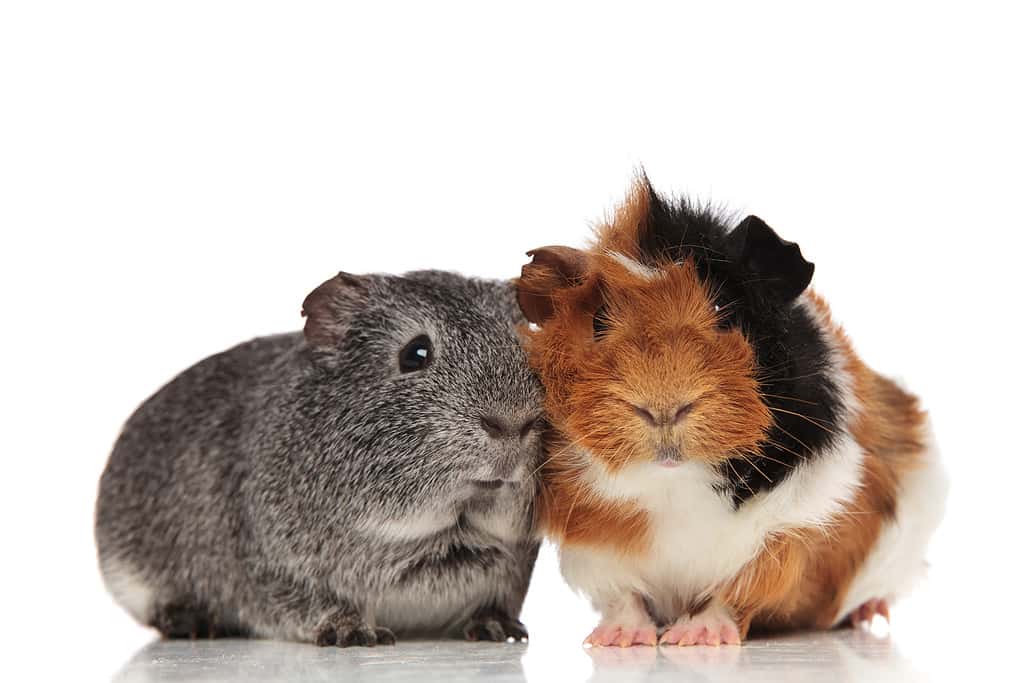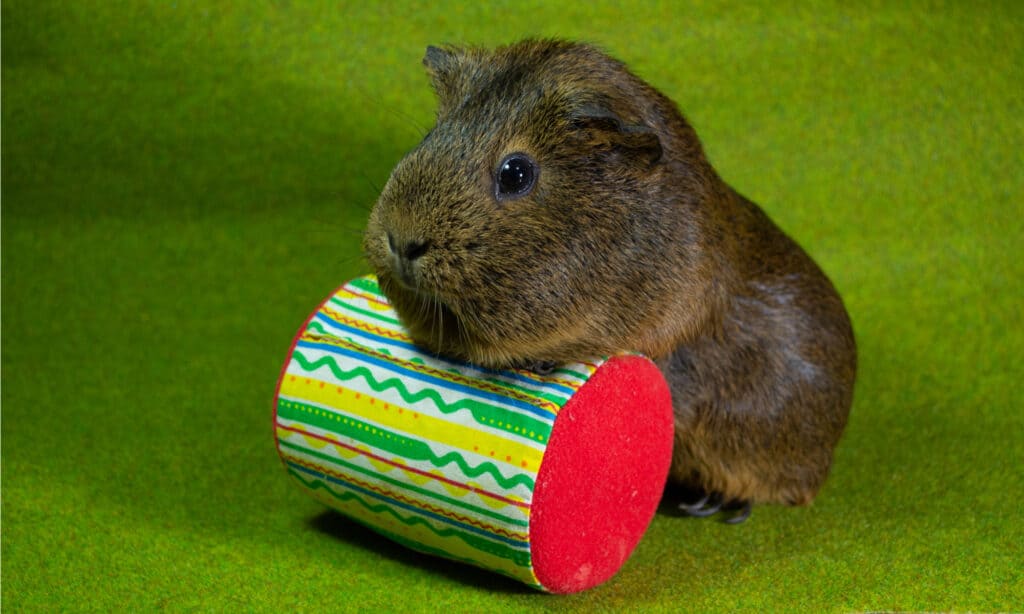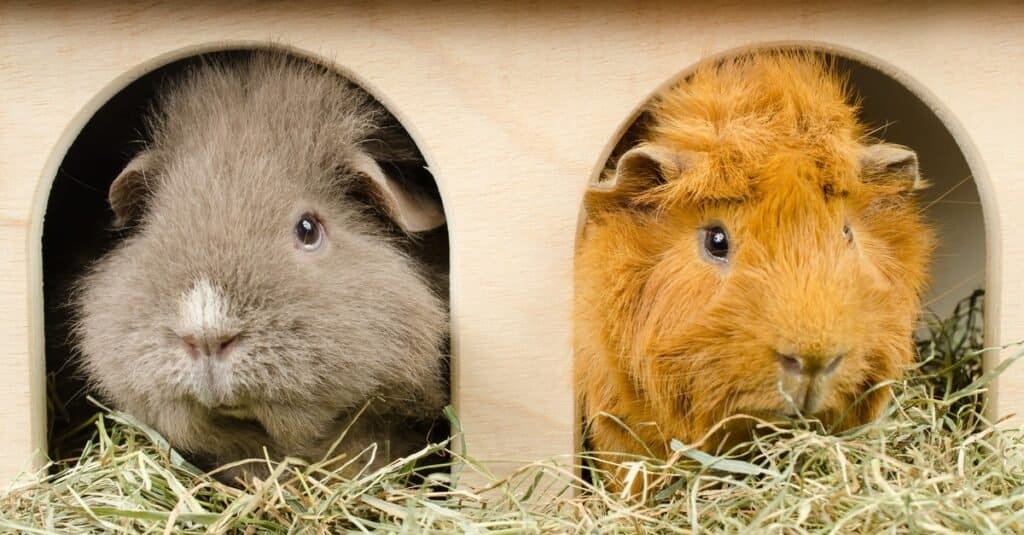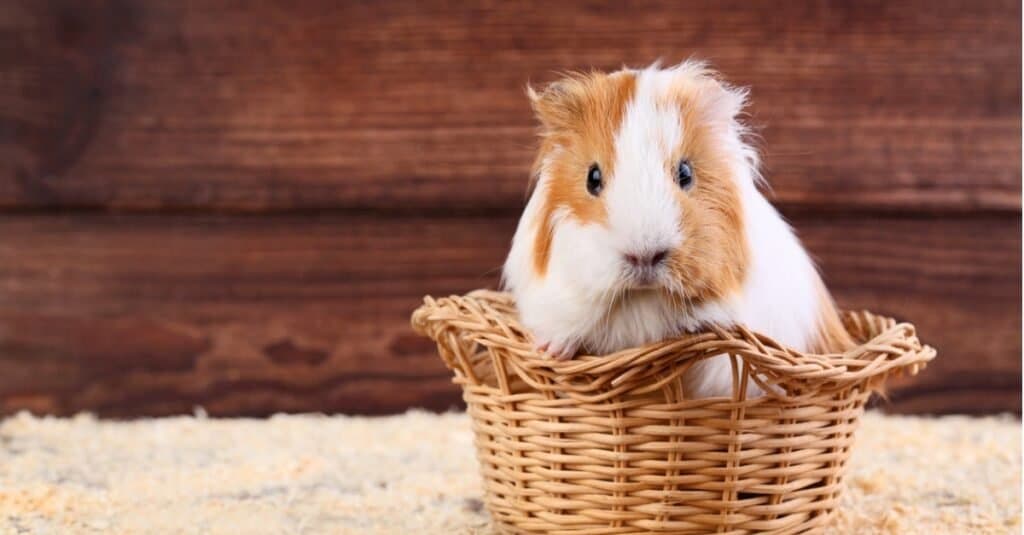Guinea pigs are medium-sized, adorable pets that children love. They are fun, energetic, and vocal. There isn’t much about them that isn’t wonderful. They can be simple to care for, and their loyalty and friendship are exceptional. But what about intelligence? How smart are guinea pigs, and how much do they understand? In this article, we will explore the world of the guinea pig, get to the bottom of their understanding, and discover how smart these little piggies are.
What is a Guinea Pig?

Guinea pigs come in many different colors and have plenty of hairdos.
©feedough/iStock via Getty Images
Guinea pigs are medium-sized rodents. They are a domesticated version of the South American rodent the cavy. Cavies traditionally have a large head, compact body, and limbs with small floppy-type ears. They are equipped with tiny hairless feet, with the hind feet containing three toes while the front feet have four toes on each foot. The rodents typically weigh between one and three pounds. Their fur can be an array of colors and textures, with some having curly, coarse hair while others may have longer, silky hair.
Guinea pigs’ diet consists of vegetation, though they are also generally fed commercial guinea pig pellets along with fresh fruits and vegetables. Their lifespan is, on average, five years, though some live to be eight years old.
Journey to the World of Pets
Over 3,000 years ago, these Peruvian wild animals were domesticated when Peruvians went from a nomadic lifestyle to agriculture. Guinea pigs do not exist in the wild, though they are still eaten in South and Central America. In the 16th century, guinea pigs were introduced to Europe and have since become popular pets. Their name may have been derived from the area where they were collected, though it is misspelled on the pets’ name: Guiana. Their meat and the squealing noises they make likely gave the animal the name of “pig.”
How Smart Are Guinea Pigs?

Guinea pigs are loving and social pets capable of empathy.
©Evgeniya Grande/Shutterstock.com
This may surprise some, but a guinea pig’s intelligence is much greater than you think. Most rodents are very intelligent, and guinea pigs are no different. They are capable of understanding a lot more than most people think. Regarding comparisons, they may not be as bright as a cat or dog, but they are far from dumb. A guinea pig can know their name, manipulate you for treats or play time, and even do your taxes! Just kidding, though, they might be able to make some fun art out of your forms!
A Guinea Pig’s Emotional Intelligence
Guinea pigs have high emotional intelligence and are capable of empathy, something some humans can’t even understand. This means hurting their feelings, making them angry, and feeling safe and loved is possible. It’s essential to treat any pet in a kind and humane way, but step up the kindness for your guinea pig, they might surprise you and do the same for you!
In the wild, guinea pigs could sense the emotions of their herd and stay in tune with the other members’ needs and feelings. They were so in tune that they were able to work out the best scenarios to keep their herd members happy and healthy. In times of danger, they fed off the emotions of the herd and devised plans to work together against a predator or other threat. That’s pretty smart for such a small, short-lived animal!
With you as their herd leader, the piggie can sense shifts in your emotions and respond accordingly. They can’t hug you when you’ve had a bad day, but they will be more nurturing and loving. Your guinea pig picks up on body language and voice changes to determine your disposition. They are one of the leading emotional support animals for people struggling with depressive and anxiety disorders because of their loving ways.
A Guinea Pig’s Memory
Regarding guinea pigs’ memory, they fare better than most rodents in long-term memory. Smaller rodents, like hamsters, have a concise term memory of only a few seconds. Rats and mice are more intelligent than guinea pigs but have comparable memory lengths so that they can be taught tricks. Guinea pigs can also learn tricks.
Their sharp memory helped them remember paths in the wild to safely navigate 14,000 feet up in the Andes Mountains of Peru, along with the herd, back to their homes in crevices or abandoned burrows. They had to be wise as prey animals without any defenses to survive. Their groups were generally ten pigs or less, and the males could be aggressive with each other while determining dominance.
Tricks to Test Your Guinea Pig’s Intelligence

Providing enough mental enrichment is one of the most important ways to keep these intelligent pets happy.
©AnBoris/Shutterstock.com
Guinea pigs love attention and are highly social. They get bored in their enclosures and need plenty of mental stimulation, such as toys. They love chewing and need toys they can chew on to keep their dental health the best it can be. Providing toys and other forms of simulation gets their mind working in a problem-solving manner. They can also learn tricks and use a litter box with some guidance. Since they tend to poop a lot, this can be extremely helpful.
Guinea pigs enjoy mazes with treats at the end. They will remember the steps taken to find the treats for a long time as a throwback to their wild ancestors. Guinea pigs also enjoy peek-a-boo when you move to new locations around the house and cover your face. They will be delighted to find you behind your hands and are great with face recognition. You can also train a guinea pig to shake hands, stand on their hind legs, and turn in circles with patience. These smart piggies can be trained to push a ball, come when called, and even play dead! Only do training sessions for no more than 20 minutes daily to not tire them out too much.
A Few Closing Words

Guinea pigs playing house!
©PHOTO FUN/Shutterstock.com
Guinea pigs make great pets and companions for just about anyone. They are intelligent, friendly, will bond with you, and love snuggling. A guinea pig’s intelligence is a bonus since they will enjoy playing with toys and interacting with you through mazes and other adorable ways. It’s best to always do plenty of research about a pet before adopting it. Also, ensure you have a vet working with guinea pigs in your area. Like all pets, they require checkups and can sometimes become ill.
When seeking guinea pigs of your own, consider going to a breeder. They tend to have healthier animals than a pet store. You will also meet guinea pigs that are already bonded as babies and pick out which you would most like to add to your household. Guinea pigs are fun pets and can be easy to care for compared to similar animals.
Fun Facts

Pet guinea pigs love to explore safe spaces and are curious about everything.
©iStock.com/5second
- Guinea pigs are active for 20 hours a day!
- Having at least two guinea pigs is essential because they are highly social herd animals and would do poorly alone.
- Guinea pigs eat some of their poop to absorb all of the nutrients and probiotics they need to break down their food and stay healthy.
- Guinea pigs get excited and popcorn, which is when they suddenly twist and shoot straight up into the air.
- Guinea pigs need extra vitamin C, just like humans, to stay in tip-top shape.
- When they yell out “wheek wheek” to their humans, they are asking for food or playtime.
- The oldest guinea pig on record was 14 years and 10 months old!
- Guinea pigs secrete a white substance out of their eyes to bathe themselves.
- Guinea pigs make many different sounds when communicating with each other and humans.
- They eat a ton of hay.
The photo featured at the top of this post is © Lillac/Shutterstock.com
Thank you for reading! Have some feedback for us? Contact the AZ Animals editorial team.







